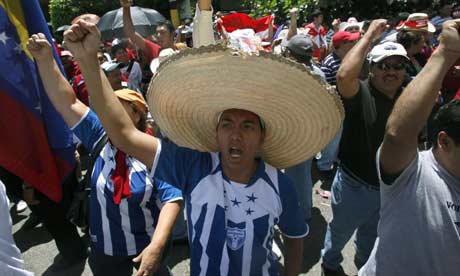
Manuel Zelaya, the ousted president of Honduras, made a dramatic return to the country yesterday to challenge the coup leaders who forced him into exile three months ago.
Zelaya evaded border controls and surfaced at the Brazilian embassy in the capital, Tegucigalpa, drawing thousands of supporters who chanted his name.
The interim government, caught off guard, at first denied that the leftwing leader was back, but then mobilised riot police and declared a curfew. "The government has declared the curfew for the entire country from 4pm until 6am to conserve calm," a spokesman said.
Zelaya's homecoming opened a new, volatile phase in a crisis which has divided Hondurans and confronted central America with its gravest diplomatic dispute since the cold war.
The president, who faces arrest on corruption and treason charges, sought sanctuary in the embassy before revealing his return and calling for talks with the interim regime. "It is the moment of reconciliation."
But since ousting him on 28 June – when soldiers awoke him in his pyjamas at gunpoint and hustled him on to a plane to exile in Nicaragua - the interim regime had ruled out power-sharing and said Zelaya would be arrested for treason and corruption if he crossed the border.
International figures appealed for calm and warned the authorities not to violate diplomatic norms. "They should be responsible for the safety of president Zelaya and the embassy of Brazil," said José Miguel Insulza, secretary general of the pan-regional Organisation of American States.
Brazil's foreign minister, Celso Amorin, said neither his country nor the OAS had facilitated Zelaya's return, but added: "We hope this opens a new stage in negotiations." He warned: "If something happens to Zelaya or our embassy it would be a violation of international law."
As helicopters hovered overhead thousands of Zelaya's mostly poor supporters, who have eagerly awaited his return, danced outside the embassy and chanted, "Yes we could! Yes we could!"
Venezuela's president, Hugo Chávez, a close Zelaya ally, was one of the first to break the news. "President Manuel Zelaya, along with four companions, travelled for two days overland, crossing mountains and rivers, risking their lives. They have made it to Honduras," Chávez said.
Zelaya, giving back-to-back media interviews, told Al-Jazeera television he had avoided many obstacles during his journey. "I had to avoid military check points crossing very close to the mountains, and sometimes through the valleys."
He said he was committed to peaceful means in his fight to be restored to his position, and said elements of the army could pressure the interim government to negotiate a deal. "There is a rupture in the morale of the army, the morale has been affected. I believe it will help in our quest for peace and dialogue," he said.
Zelaya's homecoming is a high-risk gamble to regain the initiative and spotlight on the eve of this week's UN general assembly meeting in New York.
Besides announcing a curfew there was no immediate response from interim president Roberto Micheletti last night. He has support among Honduras's middle class, but is isolated internationally.
Washington and Latin American governments condemned the 28 June coup, a joint operation by the army, congress and the supreme court which sparked furious protests by Zelaya's supporters.
0 comments:
Post a Comment